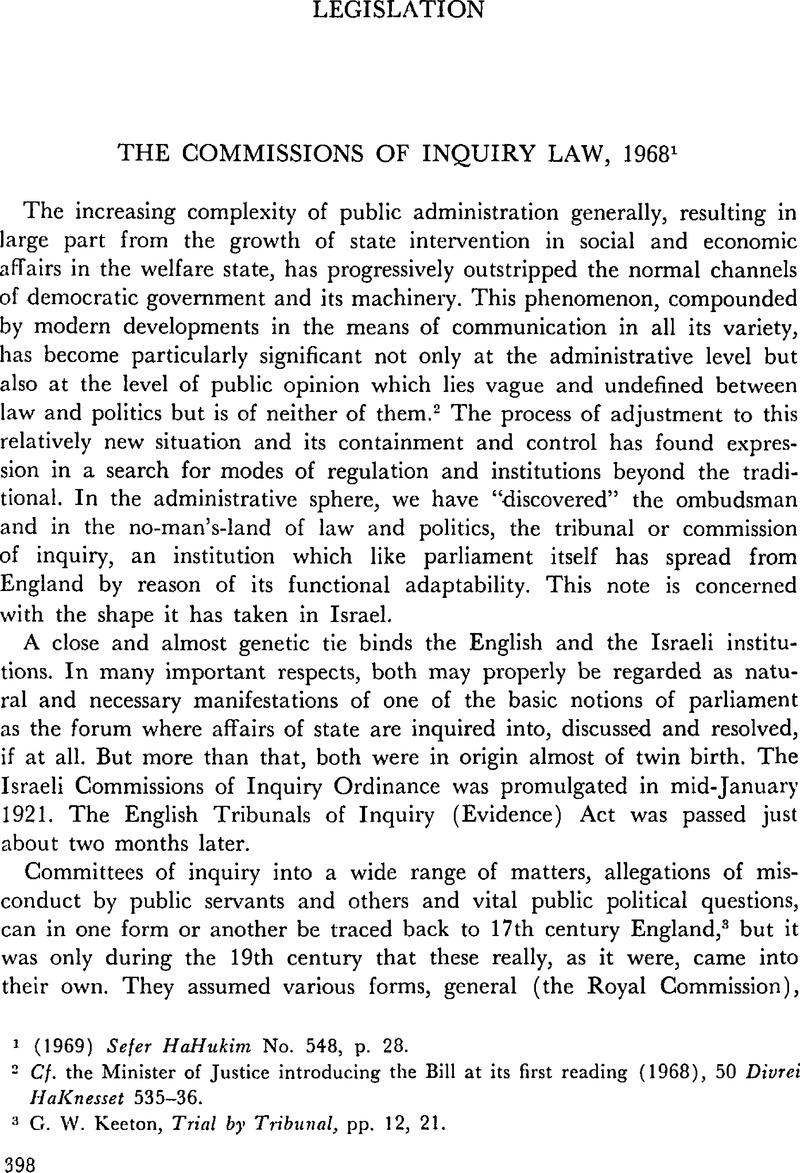No CrossRef data available.
Article contents
The Commissions of Inquiry Law, 19681
Published online by Cambridge University Press: 12 February 2016
Abstract

- Type
- Legislation
- Information
- Copyright
- Copyright © Cambridge University Press and The Faculty of Law, The Hebrew University of Jerusalem 1971
References
2 Cf. the Minister of Justice introducing the Bill at its first reading (1968), 50 Divrei HaKnesset 535–36.
3 Keeton, G. W., Trial by Tribunal, pp. 12, 21.Google Scholar
4 Ibid., p. 9.
5 (1968) 50 Divrei HaKnesset 537–38.
6 Ibid., 538; (1968) 53 Divrei HaKnesset 903.
7 Garner, J. F., Administrative Law (2nd. ed.) 23.Google Scholar
8 Ibid., p. 25.
9 See e.g., Municipalities Ordinance (New Version), sec. 3; Invalids (Pensions and Rehabilitation) Law, 1949, sec. 21; Electricity Law, 1954, sec. 7; Commodities and Services (Control) Law, 1957, sec. 13; Defence Services (Consolidated Version) Law, 1959, sec. 41; Property Tax Law, 1961, sec. 29.
10 Rubinstein, A., Constitutional Law of the State of Israel (in Hebrew), pp. 138–39.Google Scholar
11 Ibid., p. 194: Zidon, A., The Knesset (in Hebrew), pp. 260–61.Google Scholar
12 Tsemukin v. Civil Servants Disciplinary Tribunal (1957) 11 P.D. 856.
13 Ibid., 865 per Sussmann J.
14 Ibid., 862 per Cheshin D.P.
15 A. v. Minister of Health (1965) (I) 19 P.D. 122.
16 An amendment of the Law, tabled in 1970 would assimilate the commission still more closely to a court, by applying the provisions of the Criminal Code Ordinance, 1936, regarding perjury, the use of improper influence, the publication of incorrect reports of proceedings, obstruction or resistance to the execution of an order or warrant and insulting public officers or judges.
17 See e.g., the article by Y. S. Shapira, the present Minister of Justice, in Ma'ariv of Dec. 4, 1964.
18 Published in (1967) 2 Is.L.R. 313.
19 (1968) 50 Divrei HaKnesset 535, 537, 539. Cf. 53 ibid., 903.
21 53 ibid., 905.
23 (1968) 50 Divrei HaKnesset 540; cf. ibid., 545, 583.
24 Ibid., 540.
26 Cf. Salmon, op. cit. 323–24. One suggestion was that the members other than the chairman should be appointed by a special committee. Another that they be appointed by the Government itself, being as it were more alive to the requirements of public life.
27 All other meetings are fixed by the commission itself.
28 Salmon, op. cit., 316, 329, 330; Note in (1967) 30 M.L.R. 427.
29 Cf. Note in (1965) 236 Law Times 47.
30 50 Divrei HaKnesset 540.
32 (1965) 236 Law Times 33–34.
33 (1967) 117 N.L.J. 1257.
34 (1968) 118 N.L.J. 1163. In the result a special committee was appointed in 1969 under Sir Cyril Salmon to consider the law of contempt as it affects comment on statements to a tribunal of inquiry and the interviewing of potential witnesses concerning such matters. The Committee came to very much the same conclusions as had the Bar Council (Cmnd. 4078).
35 But see n. 16 above.
36 See Keeton, op. cit., p. 231; (1965) 236 Law Times 46, 74–75; (1966) 116 N.L.J. 1046.
37 (1968) 50 Diurei Haknesset 879.
* This translation has not yet appeared in the L.S.I, and is the first publication in English of the above Law.


